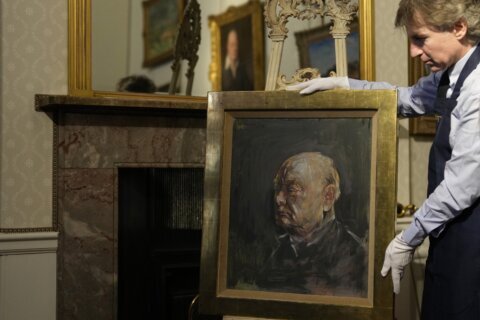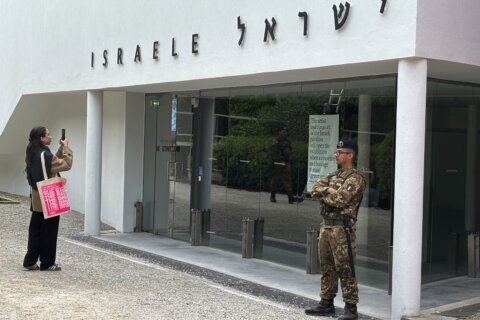NEW YORK (AP) — A display case in his old high school gave David T. Little the inspiration for his first opera — a work that 18 years later has followed an unusual path to a nomination at this year’s Grammy awards.
“Soldier Songs,” an hour-long piece for baritone and orchestral septet, depicts with unrelenting intensity the horrors of war and the PTSD faced by many returning veterans.
It calls on the singer to portray a variety of roles in quick succession, among them a boy fantasizing about going off to battle (“I want to be a real American hero”); a soldier dazed by the constant danger and bloodshed around him (“This movie is out of control … Someone yell cut!”); and a grieving father notified that his son has been killed (“Two Marines came to my house …”).
Little’s amplified, pulsating score mixes rock with classical and minimalist forms and opens and closes with repeated percussive blasts that sound like distant explosions.
The composer recalled how the idea for the piece took shape when he visited his old school. It was 2004 — three years after 9/11 — and he noticed a stark change in the exhibit space outside the auditorium.
“Where normally there would be pictures of the prom, instead there were pictures of graduates who were currently deployed, friends in uniform with machine guns,” Little said. “It was really shocking to me. I didn’t get it. I had a hard time understanding making that choice. The military felt very far away from me personally.”
He decided to interview and record former classmates who had served in Iraq and Afghanistan, as well as relatives who had fought in Vietnam or World War II. Their memories formed the basis for his libretto and their actual voices are woven into the score of the opera.
“The No. 1 thing I heard was, ‘You know, I’ve never talked about this,’” Little said. “So the piece became about the difficulty of talking about the experience.”
Since its premiere in 2006, “Soldier Songs” has been performed in a variety of stagings with considerable success. But when the pandemic hit and live performance became impossible, Opera Philadelphia decided to turn it into a film for its streaming channel.
“It’s like a lot of projects that emerged from the crisis of COVID,” said Marc Scorca, president and CEO of Opera America, “as folks figured out how they could continue to be creative and promote the art form for those who love it but couldn’t go to theaters.”
The company enlisted Johnathan McCullough, a graduate of Philadelphia’s Curtis Institute of Music, to both perform and direct. The movie was shot over eight days on the grounds of the nearby Brandywine Conservancy, site of a famous Revolutionary War battle. The only props were a dilapidated trailer home and its shabby contents, some spilling onto the grass outside.
McCullough had become interested in the topic of veterans’ PTSD after hearing stories from his fiancee, a psychiatric resident, about the cases she encountered working at the VA. Before COVID-19 struck he had been planning to produce and star in a touring version of “Soldier Songs.”
“I’d been thinking about it for a year and a half, and I had everything written down in the score,” McCullough said. “At this beat, on this note, I do this, and so forth.”
James Darrah, an experienced director who produced the film, helped McCullough carry out his double role. “He was my set of eyes on the monitor while I was in front of the camera,” McCullough said.
The score, conducted by Corrado Rovaris, the company’s music director, was pre-recorded on a soundstage, allowing McCullough to sing live during filming and avoid the artificiality of lip-synching.
Critics praised the result, and some found the cinematic version even more powerful than the original. McCullough’s “arresting adaptation,” Steve Smith wrote in The New Yorker, “vividly amplifies and extends the impact of Little’s words and music.”
Opera as film — as distinct from a video of a stage production — is somewhat of a rarity, and “Soldier Songs” is unique in that respect among this year’s five Grammy nominees for best opera recording. Two of the others are Live in HD transmissions from the Metropolitan Opera: Philip Glass’s “Akhnaten” and Francois Poulenc’s “Dialogues of the Carmelites.” The remaining two are audio recordings: Bela Bartók’s “Bluebeard’s Castle” with Susanna Mälkki conducting soloists and the Helsinki Philharmonic Orchestra; and Leos Janacek’s “The Cunning Little Vixen” with Simon Rattle conducting soloists and the London Symphony Orchestra.
Whatever happens when the Recording Academy announces the winner, just being nominated has “given a bump” to Opera Philadelphia, said David Levy, vice president for artistic operations.
“We never had a connection to the Grammys before,” Levy added. “It’s wonderful!”
Copyright © 2024 The Associated Press. All rights reserved. This material may not be published, broadcast, written or redistributed.







